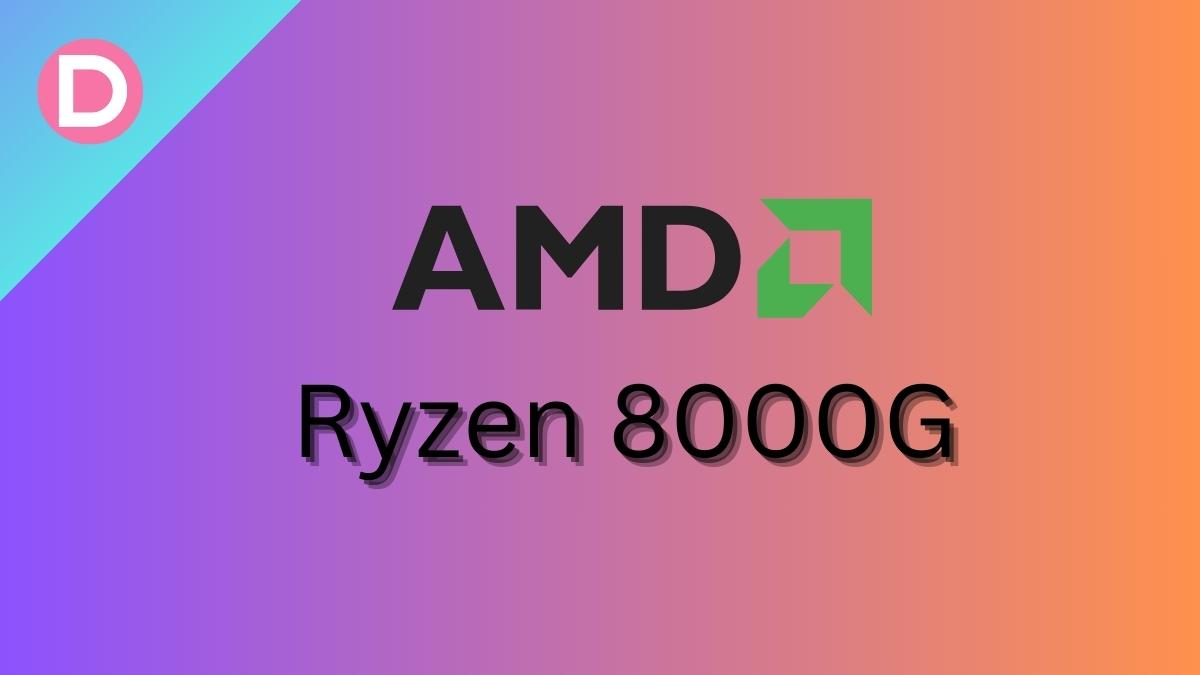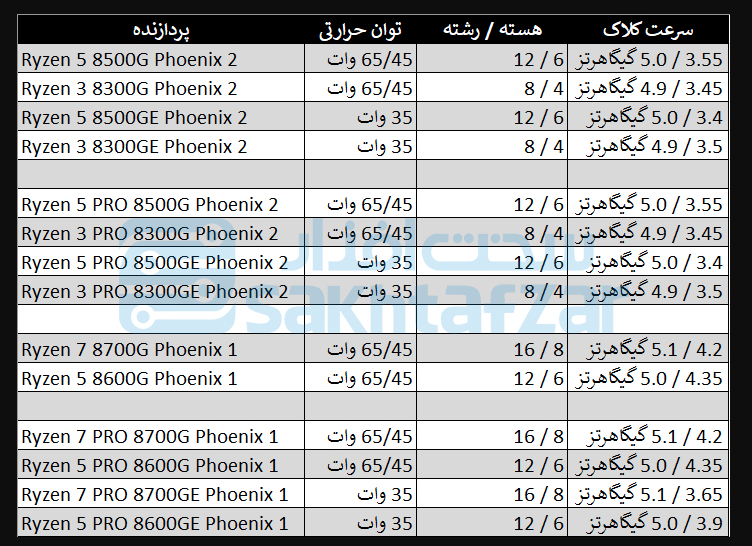AMD’s upcoming Ryzen 8000 series has been the talk of the town lately in the PC industry, especially since Intel’s latest Core 14th Gen CPUs were a bit underwhelming. We have seen quite a few leaks concerning the Ryzen 8000 series thus far. And it seems like we have one more to add to that collection.
Ryzen 8000G APUs: Leak Shows Upto 2.5 Times Better Performance Than Ryzen 5000G APUs
In the details shared by a Persian PC outlet, we get to see the key specifications of a handful of AMD Ryzen 8000G APUs, codenamed the Phoenix family. These APUs, or Accelerated Processing Units, start from the baseline Ryzen 3 series and go all the way up to the flagship Ryzen 7 series. Almost all models in this lineup come with both PRO and non-PRO SKUs.
These new APUs will come with the Zen4 core architecture on the CPU end. On the GPU end, we will see the RDNA3 core architecture. They will be supported on motherboards having the AM5 socket.
Besides that, these APUs are also divided into Phoenix 1 and Phoenix 2 families. The former will get higher end GPUs, as compared to the latter. There will also be some other things to differentiate between the two families.
Ryzen 3 8000G APUs
The baseline APU in the Ryzen 8000G line up will be the Ryzen 3 series, all of the models within belonging to the Phoenix 2 family. If we go by the leak, there will be at least four APUs in this series. We have named them below.
- Ryzen 3 8300G
- Ryzen 3 PRO 8300G
- Ryzen 3 8300GE
- Ryzen 3 PRO 8300GE
All of these APUs mentioned above come with 4 cores and 8 threads. All of them also have a boost clock frequency of 4.9 GHz. The ones ending with G have a base clock frequency of 3.45 GHz. The GE ones come with a higher base clock frequency of 3.5 GHz.
Ryzen 5 8000G APUs
The midrange section in this lineup is packed, with at least seven APUs in the Ryzen 5 series. Three of them are categorized under the Phoenix 1 family, and the remaining four come under the Phoenix 2 family. We have mentioned both of these families below.
- Ryzen 5 8600G [Phoenix 1]
- Ryzen 5 PRO 8600G [Phoenix 1]
- Ryzen 5 PRO 8600GE [Phoenix 1]
- Ryzen 5 8500G [Phoenix 2]
- Ryzen 5 PRO 8500G [Phoenix 2]
- Ryzen 5 8500GE [Phoenix 2]
- Ryzen 5 PRO 8500GE [Phoenix 2]
All of these APUs have a boost clock frequency of 5 GHz. They also have the same 6-core and 8-thread configurations. What separates the Phoenix 1 and 2 families here is the base clock frequency of the APUs. The ones ending with G in the Phoenix 1 family have it set to 4.35 GHz, as compared to the lower 3.55 GHz of the ones from the Phoenix 2 family. The GE models have a base clock frequency of 3.9 GHz and 3.4 GHz in the Phoenix 1 and Phoenix 2 families, respectively.
Ryzen 7 8000G APUs
Coming to the entry-level flagship segment, we have the Ryzen 7 lineup, consisting of three APUs, all in the Phoenix 1 family. We have mentioned them below.
- Ryzen 7 8700G
- Ryzen 7 PRO 8700G
- Ryzen 7 PRO 8700GE
All of these Ryzen 7 APUs in this lineup come with a configuration of 8 cores and 16 threads. The boost clock frequency is also the same at 5.1 GHz across all three models. The base clock frequency is 4.2 GHz on the G ones and 3.65 GHz on the GE one.
Difference in SKUs of these APUs
As you may have noticed, most of these APUs come in G and GE versions. Apart from the difference in base clock frequencies, the key difference between them is in the thermal design power, or TDP, rating. The G models come with a TDP rating of 65W/45W. On the other hand, the GE models come with that of 35W. Other than that, there does not seem to be any difference between the two.
All of these APUs also come in PRO and non-PRO SKUs. As per the details, there is seemingly no difference between them. But we are sure we will get to see the differences once more information about these APUs comes out.
Benchmark Results and Comparisons
The same source has also shared some results and comparisons of some of the aforementioned APUs based on their benchmark performance. The outlet has compared the Ryzen 7 8000G APUs with the Ryzen 7 5000G ones. And the overall conclusion of the 1080p benchmark and gaming test would be that the newer chips are significantly better. We can see as much as 2.5 times the performance of the newer chip in this test. For some context, the older chips in this comparison offer a Radeon Vega GPU.
Release Window
Most sources indicate that AMD might launch this lineup of APUs in early 2024, around the CES 2024. So, we expect to see them by the end of January at the latest. As for the price, there is not much to say except that we may see a slight rise.




